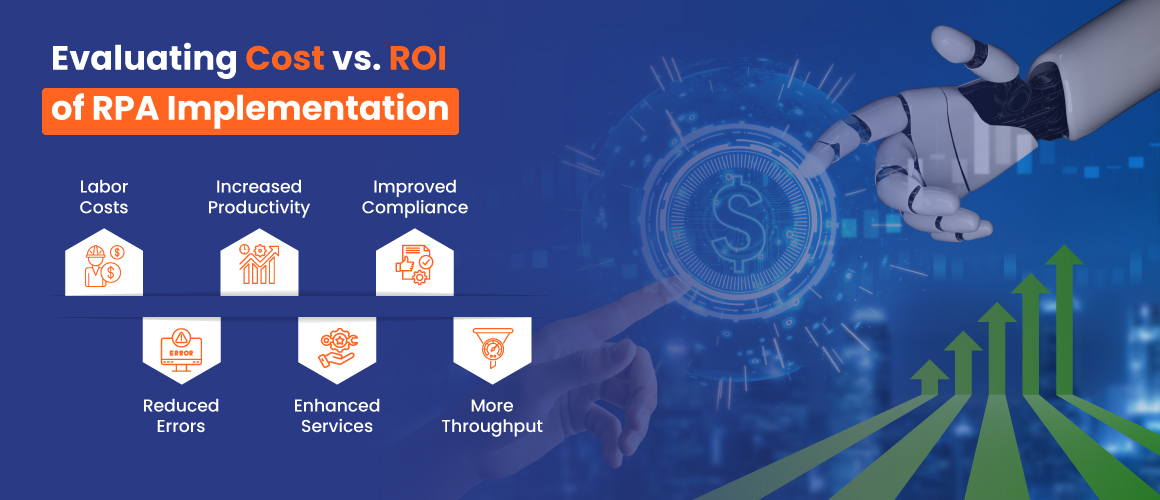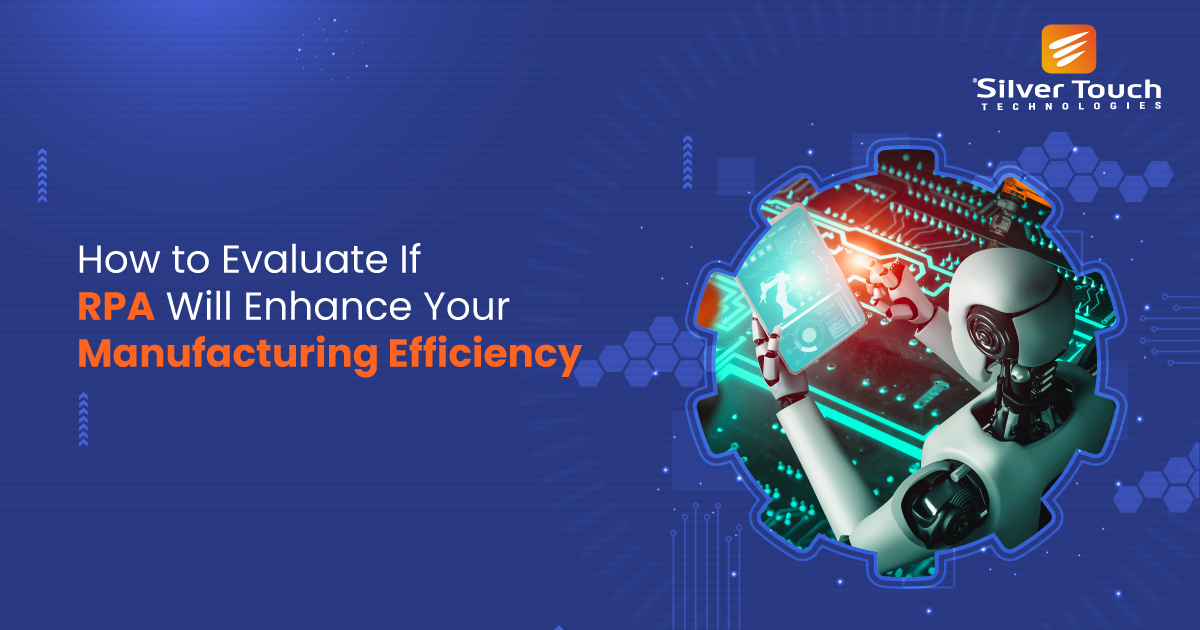Quick Summary: The RPA manufacturing industry is growing fast as software bots automate repetitive tasks, boosting efficiency, reducing errors, and lowering costs. Despite challenges like system integration and change management, the benefits are clear. With AI-driven automation, hyper automation, low-code tools, and wider SME adoption, RPA is set to transform manufacturing in the coming years.
Automation has become ubiquitous as all industry sectors want to get its benefits. The thriving manufacturing sector is no exception! Physical robots are common in the manufacturing industry performing hard labor processes like assembling and testing products. Manufacturers, these days, face struggles in managing repetitive and time-consuming tasks across different departments. Here, RPA managed services come to their rescue.
In this post, we will dig deep into the scope of RPA services in manufacturing industry. We will also compare the cost vs ROI of RPA implementation and discuss the ways to overcome potential challenges of RPA implementation. But before moving ahead, let’s have a brief overview about the scope of RPA in manufacturing.
Brief Overview of Robotic Process Automation in Manufacturing
RPA technology uses software bots to automate repetitive and rule-based tasks that humans perform traditionally. These bots can interact with existing business systems and applications to mimic actions like data entry and form filling. When it comes to the manufacturing sector, RPA bots can automate tasks across various apartments ranging from production to supply chain to inventory. As a result, manufacturers can increase their efficiency and productivity significantly.
Some of the key benefits of RPA in manufacturing are improved accuracy and reduced operating costs. RPA bots can save a lot of time and effort of employees in the manufacturing industry. It results in better efficiency and productivity.
Understanding the Scope of RPA in Manufacturing Industry
Today, RPA solutions are used in various manufacturing processes including supply chain management, quality control & inspection, production reporting, data analysis, etc. These software bots can interact with software systems like ERP, MES (Manufacturing Execution Systems), and CR. Manufacturers need to identify suitable processes and consider other aspects like change management, technology selection, and process assessment.
RPA managed services assist manufacturers in increasing efficiency and enable employees to focus on higher-value activities that need critical thinking. In a way, RPA can improve job satisfaction among employees. The next wave of RPA solutions will bring AI and ML integrations with other advanced features.
Let’s identify core areas of the manufacturing industry where RPA can add value.
Identifying Areas Where RPA Can Add Value
The first step for leveraging the benefits of RPA is the identification of areas in the manufacturing company where this technology can work wonders. Manufacturers can focus on processes that involve repetitive tasks and require rule-based decision-making. Some of these tasks might include order processing and data entry for quality control. Processes that involve a high volume of data and are prone to human errors can be good candidates for RPA managed services.
One of the most significant benefits of RPA for manufacturing lies in its potential to enhance reporting. Daily or regular tasks like generating regulatory reports and tracking audit trails are easy with RPA solutions. This is useful for reducing the risk of non-compliance significantly. Manufacturers can also look for time-sensitive processes that require consistent monitoring. RPA can add value to all such areas.
Why Assessing Your Current Manufacturing Processes is Essential
A thorough assessment of existing manufacturing processes is essential before implementing RPA solutions. This assessment enables manufacturers to identify bottlenecks and inefficiencies. Moreover, extensive assessment can help them find areas where manual intervention is necessary. This assessment involves mapping out the current workflows and identifying key data points.
Once this assessment is done, manufacturers can consult RPA managed service providers to evaluate the suitability of each process for automation. This process involves the consideration of several factors like the complexity of rules and the volume of transactions. This results in improved efficiency, enhanced compliance, and reduced errors. Assessment and documentation of current processes can be the foundation for RPA solutions and ensure their success.
Evaluating Cost vs. ROI of RPA Implementation

Implementation of RPA in manufacturing industry requires investment at the initial level. Software licensing, development costs, infrastructure expenses, and training costs include in the implementation costs. All these costs are variable as per the project requirements, technologies used, and hardware or software upgradation.
Talking about the ROI, we can consider several aspects where companies can save a huge amount of money by implementing RPA. Let’s go through these benefits-
- Labor Costs
- Increased Productivity
- Improved Compliance
- Reduced Errors
- Enhanced Services
- More Throughput
You can calculate the reduction in labor hours because of automation in repetitive tasks.
You can measure the increase in output and efficiency your company get through automation.
You can assess the reduction in risk of errors and potential fines with improved compliance.
You can quantify the cost savings associated with minimizing human errors and rework.
You can evaluate the impact of better customer services in satisfying more customers.
You can measure the amount of tasks completed in a given time period.
Manufacturers can calculate ROI for RPA implementation by using a common formula Net Benefits/Total Costs) x 100, where Net Benefits= Total Savings + Total Benefits – Total Costs.
Considering time frames and high-value processes can play a vital role in increasing ROI for RPA in manufacturing. However, it is always imperative to monitor the impact of RPA bots on daily activities to adjust calculations accurately.
Overcoming Potential Challenges of RPA Adoption
Thourh RPA implementation offers many benefits, it presents several challenges and it is essential to overcome these hurdles to get high ROI. Let’s have an overview of these challenges.
Integration challenges are crucial as most RPA solutions need to deal with legacy systems. It makes the integration complicated. However, thorough compatibility assessments and choosing the right RPA platform that has robust API support can assist you to overcome these issues.
Scalability issues occur when the usage of RPA solutions expands. It results in performance hiccups. Manufacturers can start with routine process that have clear scaling potential and ask for cloud-based RPA solutions to address these issues.
Employee resistance is also a noteworthy challenge as they may fear job displacement and resist automation in daily processes. However, comprehensive training, clear communication, and transparency in participation can assist your company to overcome this issue.
Finally, RPA managed services need to address compliance-related risks by ensuring data security and privacy protection while making bots. Regular security assessments and following best practices in developing RPA bots are effective ways to address these challenges.
Manufacturing companies can overcome these challenges proactively to ensure successful RPA adoption.
Conclusion
RPA services for manufacturing industry are crucial for saving time, reducing costs, and increasing efficiency with improved employee experience. However, manufacturers need to assess their automation requirements carefully and address implementation challenges. This can maximize the benefits of RPA and assist them to get a high ROI in a relatively short time.
Silver Touch Technologies Canada is a leading company that offers top-notch RPA services for manufacturing services. Our in-house team of experienced RPA professionals understands your business requirements and the scope of automation in your company thoroughly before initiating the project. Contact us to get end-to-end RPA managed services for your company.



